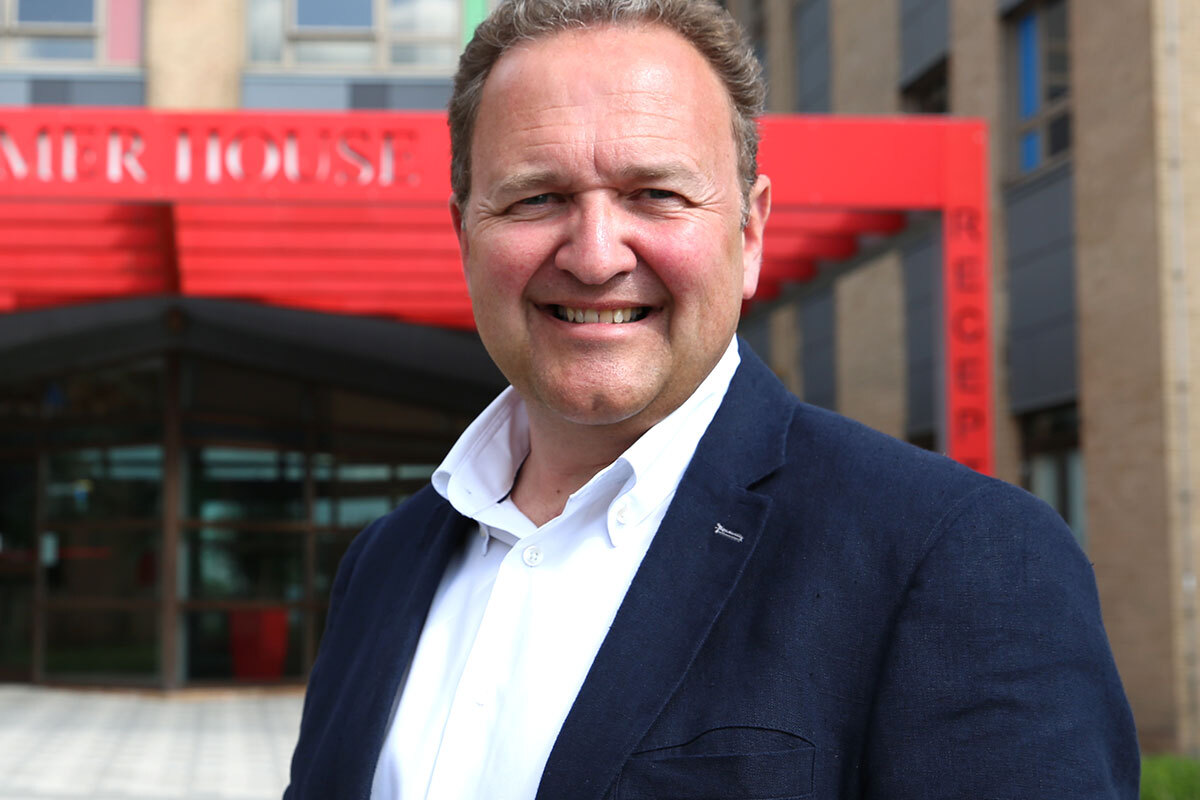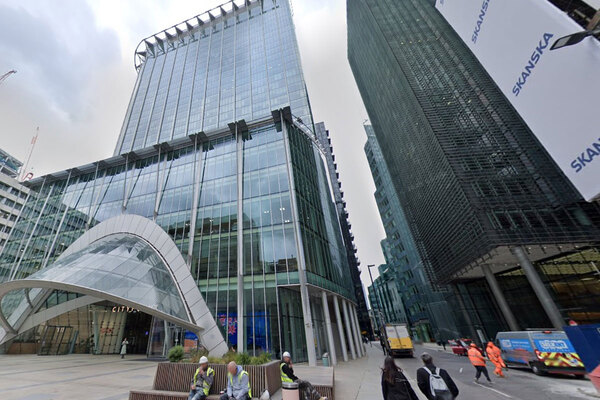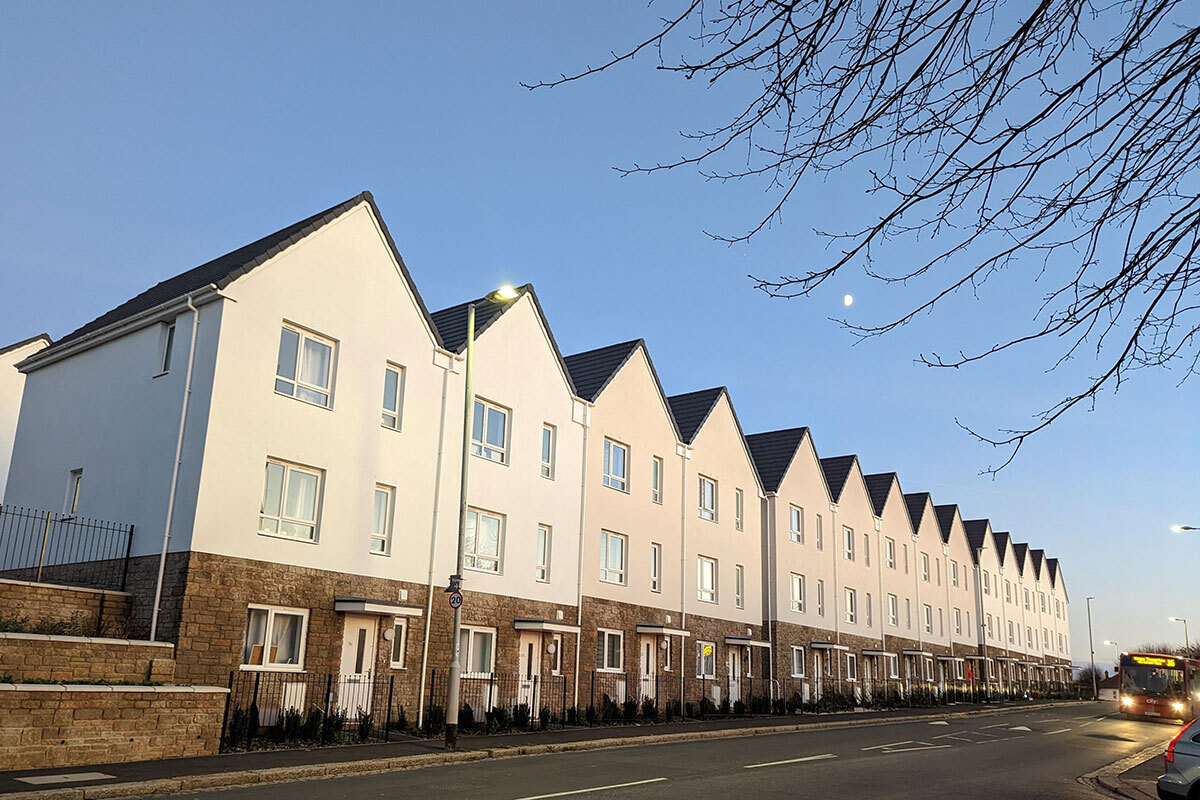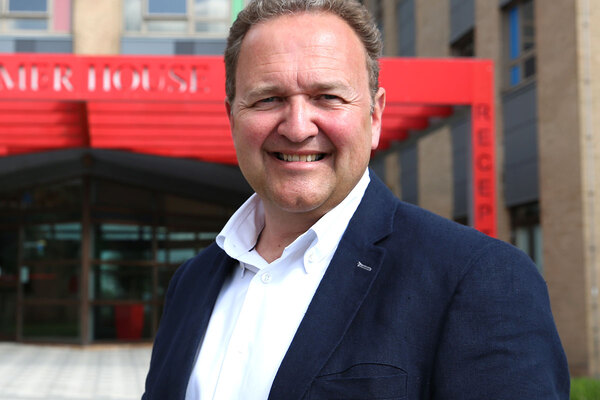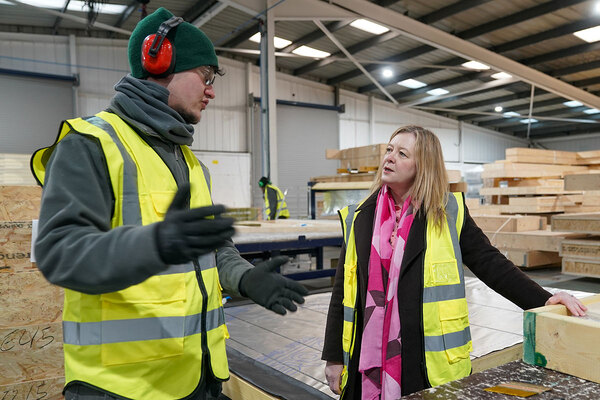You are viewing 1 of your 1 free articles
Plymouth Community Homes boss pushes for social rent: ‘We can do more with the money’
The head of the 16,000-home landlord tells Inside Housing why he is developing a new homes standard and how housing associations can be more innovative
Tucked into the ball of South West England’s dainty pointed foot is Plymouth, a port city with a distinctive housing market. Here, land prices are lower and homes more affordable than the rest of the south coast – yet low-income residents are still in desperate housing need.
It’s an environment Jonathan Cowie, chief executive of Plymouth Community Homes (PCH), is keen to take advantage of. “We can do more with the money” than other Southern housing associations, he says.
He adds that, as proof, from now on, “all of our new homes outside of shared ownership will be set at social rent”.
This is a substantial commitment – PCH built around 200 homes last year and is targeting 300 this year. It will also no doubt please Matthew Pennycook, the housing minister who recently instructed Homes England to maximise the number of social rent homes being delivered through government grant.
Mr Cowie says PCH “could probably build a bit more if we went with affordable rents. But we think, actually, it’s about liveability.” Social rents in Plymouth, he adds, are “the third lowest in the UK”.
PCH has 16,000 homes across Plymouth and the counties of Devon and Cornwall. It also sells shared ownership and open market homes (300 in all to date). In addition, it is a commercial landlord managing 170 shops. But Mr Cowie is clear that building social rent homes is the priority. Plymouth City Council wants to build 5,000 homes in the next five years, he says. “We think we can do 1,000 of those.”
Mr Cowie has just completed his first year as chief executive. He began his career in the armed forces, which feels fitting, given Plymouth’s naval heritage. After leaving the infantry (he was in the King’s Regiment, now the Duke of Lancaster’s), he spent 20 years in customer service for the telecoms sector, including at BT and Cable & Wireless.
In 2010, he was approached by Sovereign Housing, now SNG, to be its customer service director. After less than two years he was promoted to chief operating officer. He then spent three years as chief executive of CityWest Homes and four years as chief operating officer at Vivid before joining PCH in the top role in September 2023.
It was only after he joined the housing sector that he realised the impact it had had on his own family. “My grandmother was in effect saved through social housing,” he says. “She’d escaped an abusive marriage. My mum grew up in social housing. I hadn’t really made the connection, growing up.”
He was drawn to housing associations’ sense of social purpose but, coming from the private sector, he felt they were set in their ways in certain areas. On IT, for example, housing organisations are “five or 10 years behind others”.
Social housing “is kind of sat in the middle”, he says. In the private sector, innovation is driven by commerciality, while the public sector has had to be “really creative” in response to huge government spending cuts since 2008.
For housing associations, however, “your income is not under threat, your customer base isn’t going anywhere, and you have massive demand: 1.6 million homes, and we’re only building 8,000 social homes [a] year”. Consequently, the need to change and evolve “hasn’t had that same laser-like focus”.
PCH is “very customer-focused in the community, but we react to things”, he says. Often, this means saying yes to repairs and maintenance jobs without much consideration. “If I’m honest, I think some of our quite high service is because we say yes to a lot of stuff that perhaps we shouldn’t be doing, [that] isn’t our responsibility. Or it means we’re inconsistent,” he says.
He wants the landlord to be “really clear: ‘This is our baseline service.’” Residents will be invited to design “a simple set of measures” based on what they say is important, and the results will be published every quarter so residents can see how PCH is performing.
Fast-tracking stock condition surveys is another priority, to plan net-zero improvements, but also to be smarter about why some residents keep requesting repairs.
“I ran an ALMO in London, and we had a lot of leaks,” he says. “When we boiled down and understood the why, it was because we didn’t have a gutter-cleaning maintenance programme, so the gutters were getting clogged… We reduced leaks within 12 months by 30%, and that was just because you understood the why.”
At every board meeting, Mr Cowie receives a ‘customer sentiment’ report to capture what his colleagues in the call centre are hearing. If the landlord truly understands what is driving residents to contact it, he says, that will help it to be more proactive – but you need data and digitisation to do that.
Better data is also crucial for PCH’s maintenance programme. “We’ll spend £1bn in the next 10 years in Plymouth and beyond,” Mr Cowie says. To help guide how this is spent, PCH is working with a number of universities to create a new home standard, inspired by SNG’s in-house home and place standard. This will consider health and longevity, and will apply to both new and existing homes.
Data should also be applied to PCH’s development plans, he says. “We’re going to do some work to really profile what an ideal mixed community looks like.” Should PCH build more disability-accessible homes, for example? If so, “we could designate 10% of all of our properties to be disability-adapted from day one”. The idea is to make these interventions at the capital stage, which “clearly is far more cost-effective”.
Mr Cowie is clear about the need for a big regeneration programme in the coming years. Much of PCH’s stock dates to the 1950s and 1960s. Council homes were built after the city was bombed heavily in World War II, but some of the stock is even older than that.
In September, the landlord completed a £130m, 12-year regeneration scheme called North Prospect. The site consisted of ‘homes for heroes’ built after World War I, but had sunk into deprivation by the 1990s. Rebuilding it was one of PCH’s first commitments upon its formation via a council stock transfer in 2009.
A total of 605 social rent properties in North Prospect were demolished and replaced with 1,100 new homes, including 491 for affordable and social rent, 195 for shared ownership and 477 for market sale. PCH also refurbished a further 300 social rent homes. During the final three phases, over 70% of residents were able to move back into new homes in the neighbourhood. The housing association claims the regeneration has reduced crime in the area by 59%.
Plymouth has “a really interesting city centre”, Mr Cowie says. “It’s one of the only centres I’ve seen where you haven’t got accommodation above the shops right in the heart of it.” PCH is working with the council on a masterplan to redevelop the heart of the city, including putting homes on the second and third floors of commercial buildings.
PCH was downgraded to a V2 viability rating by the Regulator of Social Housing in 2023, before Mr Cowie joined. He says the decision was due to the investment PCH was putting into existing homes, as well as “inflationary pressures”, and points out that PCH was upgraded to A+ by Standard and Poor’s late last year due to its strengthened leadership team.
Mr Cowie is not cowed. “We’ve got an internal red line that our margin stays above 20%. We have low debt; I think it’s about £8,000 per property. So our margin, with our current plan, over the next five to seven years, grows to about 27%-28%. And we’ve just added an additional £55m in for carbon [reduction] into our 30-year plan this year. So I think we’ve got the right foundations.”
Recent longform articles by James Riding
Dagenham fire: what happened and what we know about the building
A fire at a block of flats in Dagenham, east London, on Monday has sparked fresh debate about the slow progress of cladding remediation in the UK. James Riding runs through what we know so far
Peter Denton discusses the Homes England review and Section 106 jitters
Homes England’s chief executive tells James Riding that a new government review is a “call to arms” for the agency to take a more hands-on role in development
The man who runs Homes England’s Affordable Homes Programme
Shahi Islam speaks to James Riding about his new role as director of Homes England’s Affordable Homes Programme and his desire to be “more front-facing” in the sector
Sign up for our development and finance newsletter
Already have an account? Click here to manage your newsletters
